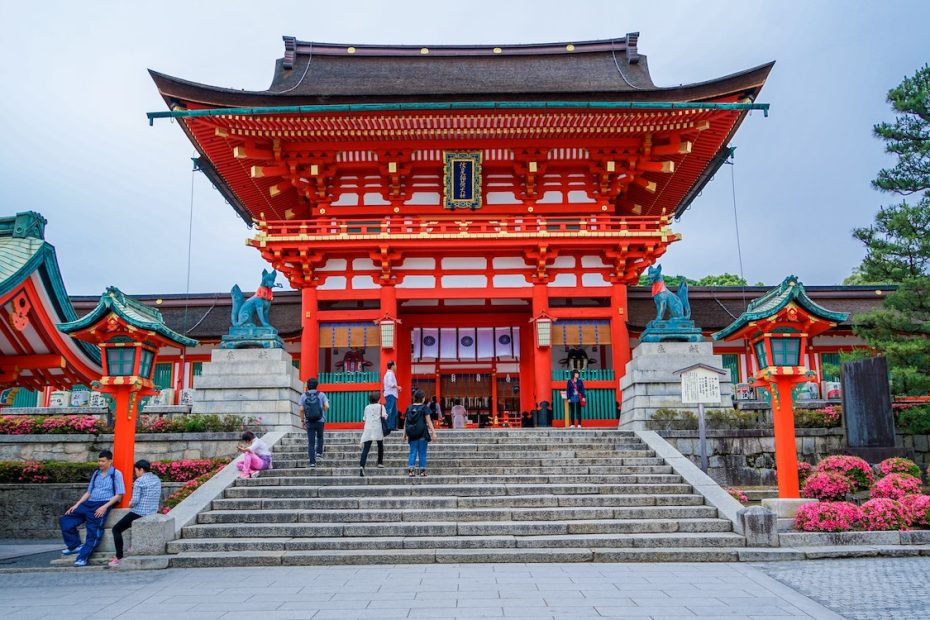Japan is constantly expanding internationally as a result of its businesses’ aggressive global competition, which offers graduates promising work chances. In addition to being more economical than in many other G7 countries, studying for a bachelor’s degree in Japan also offers several scholarship options. All of this is prompting more students to inquire about studying in Japan. This post is will focus on examining why you need to study in Japan.
Japan is a popular destination for students due to its excellent safety, accessibility, and high quality of living standards. Studying abroad in Japan allows you to advance your studies in a well-rounded educational system, discover a fascinating new culture, and get a more global perspective!
Japan is well-known for its strong educational system, and it is one the top-performing OECD countries in reading, literacy, math, and science, with the average student scoring 529, considerably above the OECD average of 486. Higher than the OECD average of 78%, 94.6% of Japanese adults aged 25-64 have finished upper secondary education.
Japan continues to attract people all over the world as a nation that has successfully integrated advanced technology into its social structure while upholding its distinctive culture. Japanese institutions now offer more degree programs taught in English in addition to the Japanese language, making Japan a more sought-after study abroad option.
In Japan’s universities, there are now more than 90% more international students than there were ten years ago.

Reasons Why You Need To Study in Japan
Studying in Japan will open up prospects for you that you never would have imagined were possible because it has the second-biggest developed economy in the world, ranks third in the world for vehicle production, and has the largest electronics goods industry.
Japanese people have a reputation for being highly creative and precise. You will learn from the finest, whether in designing technological products or premium clothing! Here are some excellent justifications for thinking about studying in Japan!
1. Safe Environment
Why do you need to study in Japan? Safety! One of the safest nations in the world is Japan. Japan has a very low crime rate and a very low drug use rate. Tokyo and Osaka are ranked as the world’s safest cities by the Economist Intelligence Unit, respectively.
Japan occasionally experiences natural calamities, but it also has very strong building standards. Japan is at the forefront of earthquake-resistant infrastructure in the world thanks to generations of developments brought about by the country’s natural tendency for earthquakes.
Japan was also the first nation in the world to codify environmental protections, and it still has highly strict laws governing food safety. The superb medical system in Japan, to which you will have access as a student owing to the very reasonable national health insurance system, is one of the reasons why Japanese people have the longest life expectancy in the world, according to the World Health Organization.
2. High Standard of Education
Japan is known for having a top-notch educational system, and it leads the OECD in reading comprehension, math, and science with an average student score of 529, far higher than the OECD average of 486. In comparison to the OECD average of 78%, 94.6% of Japanese adults between the ages of 25 and 64 have finished upper secondary education.
Degrees from Japanese universities are recognized globally since they are all governed by the Ministry of Education, Science, and Technology (MEXT). You may be sure that you will receive a top-notch education if you decide to attend a university in Japan.
3. Employment Opportunities
The next reason why you need to study in Japan is employment opportunities. As the third-largest economy in the world, Japan is home to numerous renowned global corporations in the manufacturing, automotive, and technology industries. Knowing the Japanese language and business culture might be very helpful for your future job both in Japan and overseas because Japanese businesses are active all over the world.
It is well knowledge that Japan is subject to demographic challenges due to the country’s rapidly ageing and declining population. For international students who graduate from Japanese universities, this is opening up excellent work chances.
Many industries are experiencing a scarcity of skilled workers, and there is growing competition among businesses for bilingual and trilingual employees. The majority of employers will still demand that you speak Japanese fluently, which you can do by enrolling in a Japanese university. A growing number of jobs do not demand that you speak Japanese at the JLPT N1 level.
Japan has relatively hospitable immigration regulations for professionals. International graduates of Japanese institutions are eligible to renew their work visas as many as they’d like, as long as they continue to hold employment, unlike graduates from other nations that have a maximum number of years they can “stay back” in the country. Currently, in Japan, there is a points-based road to permanent residency that gives bonus points to foreign students who have graduated from Japanese universities.
4. Learning the Language
Immersion is your greatest option if you want to learn Japanese fluently because it can be difficult to do so. And what other opportunity would there be to fully immerse yourself during study abroad programs in Japan? Learning Japanese well is a terrific way to improve your resume, especially if you want to work for a Japanese company.
Japanese businesses are always interested in bilingual, international applicants due to the country’s increasingly globalized economy. Learning Japanese is the best course of action if you want to get a job! The greatest technique to master Japanese as rapidly as possible is to surround yourself with native Japanese speakers.
5. Affordable Tuition and Scholarships
International students at many Japanese colleges pay the same tuition rates as domestic Japanese students, which makes Japan a more cheap travel destination than many other countries. The JASSO (Japan Student Services Organization) and MEXT scholarships are two ways that the Japanese government promotes international education.
In addition, you can apply for academic merit scholarships at the majority of universities. You might earn a four-year waiver of 25%, 50%, 75%, or 100% of your tuition, facility, and equipment costs if you qualify for one of UCLA’s four tiers of academic merit scholarships. It’s simple to apply for a scholarship at UCLA by including an additional essay with your application.
Additionally, a substantial list of foundational and private scholarships can help you during your stay in Japan. Many individuals believe that Japan’s cost of living is expensive. However, the cost of living significantly drops if you leave major cities like Tokyo or Osaka.
The average annual tuition for an overseas student at a typical US public college is USD 26,290, according to Times Higher Education. USD 35,830 would be the average annual cost of attendance at a private, non-profit college. A Japanese university’s annual tuition is roughly half to a fourth of what it would be at a US institution.
Check the prices at the specific universities you are interested in as tuition fees will vary between various universities. Studying abroad in Japan is a more affordable choice than in many other nations due to the ability of international students to perform part-time jobs for up to 28 hours per week during the semester and up to 40 hours per week during the summer.
6. Learn About Japanese Culture, History, and Nature
Many people all around the world are still fascinated by the culture and history of Japan. Japan is a nation that makes a lot of effort to preserve its historical landmarks and cultural history, which frequently results in distinctive juxtapositions of the urban and the ancient. To date, 23 locations in Japan have been designated as UNESCO World Heritage Sites in recognition of this.
The intricacy of Japanese is inextricably related to and expressed in its culture and art since it is one of the highest context languages, which means that communication depends on comprehension of the underlying cultural context rather than the literal meaning of the words.
You can appreciate Japan’s history, towns, shrines, temples, Samurai culture, and anime to a greater extent if you learn more Japanese while residing and studying there. Analyzing the distinctive aesthetics and art forms of Japan may motivate you to examine your core values, which can help you develop a deeper knowledge of other cultures and yourself.
7. Good Standard of Living
Your outlook will change after using a Japanese toilet. This is not a farce. Many toilets have seat warmers, heated bidets, and even the ability to play music if you’re sensitive to bathroom noises. The thought that goes into something as simple as a toilet is a metaphor for Japanese life quality.
When studying abroad in Japan, you can take advantage of comfort and care, efficiency, and convenience. Politeness is important to Japanese society, and you will be greeted with warmth wherever you go. This is in addition to the fantastic food, excellent educational and medical systems, and first-rate transportation infrastructure.
8. Go on Adventures
Many Japanese cities have excellent public transportation systems that are swift, dependable, and comfortable. Millions of people use it every day, particularly in major cities where public transportation is the most efficient and convenient mode of transportation.
Why fight with traffic and parking when you can take the train and arrive in half the time? The public transportation system is well-known for its regularity and efficiency, making travelling to class a breeze. If you want to go around Japan, take a shinkansen (bullet train).
Although it is an expensive experience, boarding the bullet train is a must-do in Japan! Of course, as a student, you have budget possibilities. Many cities are linked by convenient overnight buses, so ensure that you don’t miss out on experiencing all of Japan during your study abroad journey.
9. Enjoy Affordable Japanese Dish

Why you need to study in Japan? Of course, for the excellent cuisine! You’ve probably heard a little bit about Japanese cuisine. You’ve probably tasted savoury treats like sushi and ramen, but there are so many different dishes to try.
You will be able to sample a variety of delectable tofu, fish, and fermented vegetables. Takoyaki, a type of fried street dish, will make your mouth water. Yakiniku (Japanese BBQ) is a social experience for you and your study-abroad peers. The day can then be completed with several types of mochi and red bean desserts.
10. Build Connections and Lifelong Friendship
A lifetime of international friendships and potential career contacts will result from studying in Japan and sharing this special experience with your fellow students. More than 40 additional nations will have students studying with you.
As a result, the student body is highly close-knit, varied, and welcoming, and there is a strong sense of community that you might not find at larger campuses. You will receive a superb cross-cultural education by living and learning with students from all over the world, which will help you throughout your entire post-university career.
Frequently Asked Questions
What is Japan Well-Known For Studying?
Japan is well-known for its strong educational system, and it is the best-performing OECD countries in reading, literacy, math, and science, with the average student scoring 529, considerably above the OECD average of 486.
How Long is The Japanese Student Visa?
The residency status will be “Student.” Depending on the length of the study time, a student visa may be given for a stay of 6 months to a maximum of 2 years. Depending on your enrollment duration, you may be able to prolong your stay by renewing your student visa.
Can I Stay in Japan When I Graduate From My Studies?
The applicant may stay in Japan for six months following graduation if their application is approved. Only one extension for a total of one year may be requested during the period stay.
Conclusion
What exactly are you waiting for? Now that you have a handy list of reasons to study abroad in Japan, it’s time to pack your bags and travel! Whether it’s the stunning temples, delectable sushi, or heated toilet seats that entice you, studying abroad in Japan is an unforgettable experience.
Travelling and living in Japan is an incredible experience, especially as a student. Japan is a popular destination for students due to its excellent safety, accessibility, and high quality of living standards. Studying abroad in Japan allows you to advance your studies in a well-rounded educational system, discover a fascinating new culture, and get a more global perspective! Win-win-win.
